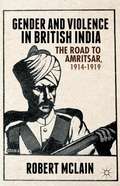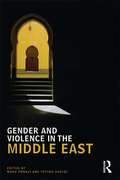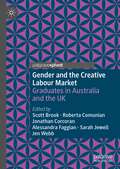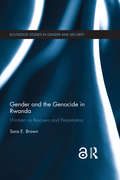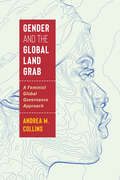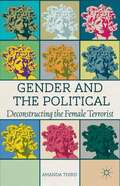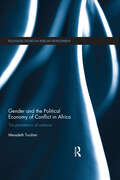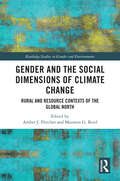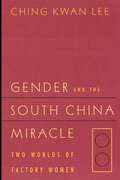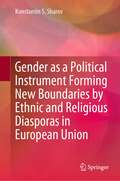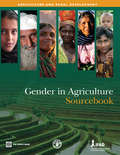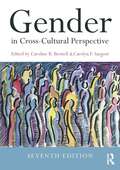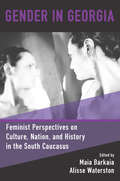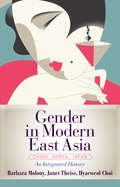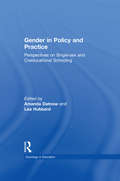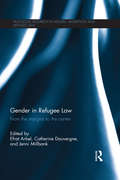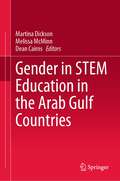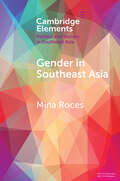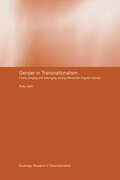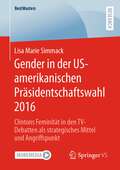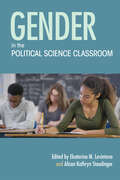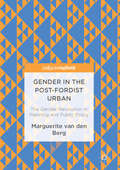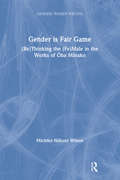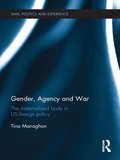- Table View
- List View
Gender and Violence in British India
by Robert MclainIn British India, the years during and following World War I saw imperial unity deteriorate into a bitter dispute over "native" effeminacy and India's postwar fitness for self-rule. This study demonstrates that increasingly ferocious dispute culminated in the actual physical violence of the Amritsar Massacre of 1919.
Gender and Violence in the Middle East (UCLA Center for Middle East Development (CMED) series)
by Fatima Sadiqi Moha EnnajiThis book explores the relationship between Islamism, secularism and violence against women in the Middle East and North Africa. Drawing on case studies from across the region, the authors examine the historical, cultural, religious, social, legal and political factors affecting this key issue. Chapters by established scholars from within and outside the region highlight: the interconnections of violence and various sources of power in the Middle East: the state, society, and the family conceptions of violence as family and social practice and dominant discourse the role of violence as pattern for social structuring in the nation state. By centring the chapters around these key areas, the volume provides an innovative theoretical and systematic research model for gender and violence in the Middle East and North Africa. Dealing with issues that are not easily accessible in the West, this book underlines the importance of understanding realities and problems relevant to Muslim and Arab societies and discusses possible ways of promoting reforms in the MENA region. As such it will be of great interest to students and scholars of gender studies, sociology, political science and criminal justice.
Gender and the Creative Labour Market: Graduates in Australia and the UK
by Jen Webb Alessandra Faggian Roberta Comunian Sarah Jewell Jonathan Corcoran Scott BrookThis book describes the early career outcomes for female creative graduates in Australia and the UK. It applies the international UNESCO model of the Cultural and Creative Industries (CCIs) to national graduate destination survey data in order to compare creative women’s employment outcomes to those of men, as well as non-creative graduates. Chapters focus on opportunities for creative and cultural work, including salaries, geographic mobility, graduate jobs, underemployment, and skills transferability. The model covers a broad range of cultural and creative domains such as heritage, the performing arts, visual arts and craft, publishing and media industries, fashion, architecture and advertising. The book’s purpose is to provide an informed discussion and empirical report to key stakeholders in the topic, such as academic researchers, teachers and students, as well as cultural sector organisations and education departments.
Gender and the Genocide in Rwanda: Women as Rescuers and Perpetrators (Routledge Studies in Gender and Security)
by Sara E. BrownThis book examines the mobilization, role, and trajectory of women rescuers and perpetrators during the 1994 genocide in Rwanda. While much has been written about the victimization of women during the 1994 genocide in Rwanda, very little has been said about women who rescued targeted victims or perpetrated crimes against humanity. This book explores and analyzes the role played by women who exercised agency as rescuers and as perpetrators during the genocide in Rwanda. As women, they took actions and decisions within the context of a deeply entrenched patriarchal system that limited their choices. This work examines two diverging paths of women’s agency during this period: to rescue from genocide or to perpetrate genocide. It seeks to answer three questions: First, how were certain Rwandan women mobilized to participate in genocide, and by whom? Second, what were the specific actions of women during this period of violence and upheaval? Finally, what were the trajectories of women rescuers and perpetrators after the genocide? Comparing and contrasting how women rescuers and perpetrators were mobilized, the actions they undertook, and their post-genocide trajectories, and concluding with a broader discussion of the long-term impact of ignoring these women, this book develops a more nuanced and holistic view of women’s agency and the genocide in Rwanda. This book will be of much interest to students of gender studies, genocide studies, African politics and critical security studies. The Open Access version of this book, available at https://www.routledge.com/Gender-and-the-Genocide-in-Rwanda-Women-as-Rescuers-and-Perpetrators/Brown/p/book/9780367188092, has been made available under a Creative Commons Attribution-Non Commercial-No Derivatives 4.0 license.
Gender and the Global Land Grab: A Feminist Global Governance Approach (Frontiers of Global Governance)
by Andrea M. CollinsSince the year 2000, millions of hectares of land in the Global South have been acquired by foreign investors for large-scale agricultural projects, displacing and disrupting rural communities. Women are especially disadvantaged by the global land grab: they are less likely to inherit, control, or make decisions over land, but often need land to support themselves, their families, and their communities. While international organizations have developed global guidelines to improve land governance, tensions still run high as the current policies fall short.Gender and the Global Land Grab introduces a feminist conceptual framework to analyze land governance policy around the world. Andrea Collins shows how gender norms, biases, and expectations shape land politics at different levels of governance. Drawing on examples from sub-Saharan Africa and with an in-depth case study of land politics in Tanzania, the book assesses guidelines developed by institutions such as the Food and Agriculture Organization of the United Nations and the World Bank to highlight essential considerations for developing and implementing gender-sensitive policy.Illustrating how gender shapes resource policy across all levels of political activity, Gender and the Global Land Grab provides valuable tools for transforming global policymaking.
Gender and the Judiciary in Africa: From Obscurity to Parity? (Routledge Research in Gender and Politics)
by Gretchen Bauer Josephine DawuniBetween 2000 and 2015, women ascended to the top of judiciaries across Africa, most notably as chief justices of supreme courts in common law countries like Ghana, Nigeria, Sierra Leone, Gambia, Malawi, Lesotho and Zambia, but also as presidents of constitutional courts in civil law countries such as Benin, Burundi, Gabon, Niger and Senegal. Most of these appointments was a "first" in terms of the gender of the chief justice. At the same time, women are being appointed in record numbers as magistrates, judges and justices across the continent. While women’s increasing numbers and roles in African executives and legislatures have been addressed in a burgeoning scholarly literature, very little work has focused on women in judiciaries. This book addresses the important issue of the increasing numbers and varied roles of women judges and justices, as judiciaries evolve across the continent. Scholars of law, gender politics and African politics provide overviews of recent developments in gender and the judiciary in nine African countries that represent north, east, southern and west Africa as well as a range of colonial experiences, postcolonial trajectories and legal systems, including mixes of common, civil, customary, or sharia law. In the process, each chapter seeks to address the following questions: What has been the historical experience of the judicial system in a given country, from before colonialism until the present? What is the current court structure and where are the women judges, justices, magistrates and other women located? What are the selection or appointment processes for joining the bench and in what ways may these help or hinder women to gain access to the courts as judges and justices? Once they become judges, do women on the bench promote the rights of women through their judicial powers? What are the challenges and obstacles facing women judges and justices in Africa? Timely and relevant in this era in which governmental accountability and transparency are essential to the consolidation of democracy in Africa and when women are accessing significant leadership positions across the continent, this book considers the substantive and symbolic representation of women’s interests by women judges and the wider implications of their presence for changing institutional norms and advancing the rule of law and human rights.
Gender and the Political
by Amanda ThirdThe female terrorist circulates within contemporary Western culture as an object of fascination and heightened concern. Gender and the Political analyses cultural constructions of the female terrorist, arguing that she operates as a limit case of both feminine and feminist agency. Drawing on an interdisciplinary theoretical framework, this book demonstrates that the development of the discourse on terrorism evolves in parallel with, and in response to, radical feminism in the US in the late 1960s and early 1970s. Situated at the borderlines between sexuality, threat and abjection, Amanda Third argues that the figure of the female terrorist compels a reexamination of the project of radical politics and the limits of modernity.
Gender and the Political Economy of Conflict in Africa: The persistence of violence (Routledge Studies in African Development)
by Meredeth TurshenViolence affects the economy of production and the ecology of reproduction— the production of economic goods and services and the generational reproduction of workers, the regeneration of the capacity to work and maintenance of workers on a daily basis, and the renewal of culture and society through community relations and the education of children Gender and the Political Economy of Conflict in Africa explores the persistence of violence in conflict zones in Africa using a political economy framework. This framework employs an analysis of violence on both edges of the spectrum—a macro-economic analysis of violence against workers and a micro-political analysis of the violence in women’s reproductive lives. These analyses come together to create a new explanation of why violence persists, a new political economy of violence against women, and a new theoretical understanding of the relation between production and reproduction. Three case studies are discussed: the Democratic Republic of the Congo (violence in an era of conflict), Sierra Leone (violence post-conflict), and Tanzania (which has not seen armed conflict on the mainland). This book fills a significant gap on the political economy of war and women/gender for advanced undergraduate and postgraduate students as well as researchers in African Studies, Gender Studies, and Peace and Conflict Studies.
Gender and the Social Dimensions of Climate Change: Rural and Resource Contexts of the Global North (Routledge Studies in Gender and Environments)
by Amber J. Fletcher and Maureen G. ReedDispelling the myth that people in the Global North share similar experiences of climate change, this book reveals how intersecting social dimensions of climate change—people, processes, and institutions—give rise to different experiences of loss, adaptation, and resilience among those living in rural and resource contexts of the Global North. Bringing together leading feminist researchers and practitioners from three countries—Australia, Canada, and Spain—this collection documents gender relations in fossil fuel, mining, and extractive industries, in land-based livelihoods, in approaches for inclusive environmental policy, and in the lived experience of climate hazards. Uniquely, the book brings together the voices, expertise, and experiences of both academic researchers and women whose views have not been prioritized in formal policies—for example, women in agriculture, Indigenous women, immigrant women, and women in male-dominated professions. Their contributions are insightful and compelling, highlighting the significance of gaining diverse perspectives for a fuller understanding of climate change impacts, more equitable processes and strategies for climate change adaptation, and a more welcoming climate future. This book will be vital reading for students and scholars of gender studies, environmental studies, environmental sociology, geography, and sustainability science. It will provide important insights for planners, decision makers, and community advocates to strengthen their understanding of social dimensions of climate change and to develop more inclusive and equitable adaptation policies, plans, and practices.
Gender and the South China Miracle: Two Worlds of Factory Women
by Ching Kwan LeeBoth Yuk-ling, a busy Hong Kong mother of two, and Chi-ying, a young single woman from a remote village in northern China, work in electronics factories owned by the same foreign corporation, manufacturing identical electronic components. After a decade of job growth and increasing foreign investment in Hong Kong and South China, both women are also participating in the spectacular economic transformation that has come to be called the South China miracle. Yet, as Ching Kwan Lee demonstrates in her unique and fascinating study of women workers on either side of the Chinese-Hong Kong border, the working lives and factory cultures of these women are vastly different.In this rich comparative ethnography, Lee describes how two radically different factory cultures have emerged from a period of profound economic change. In Hong Kong, "matron workers" remain in factories for decades. In Guangdong, a seemingly endless number of young "maiden workers" travel to the south from northern provinces, following the promise of higher wages. Whereas the women in Hong Kong participate in a management system characterized by "familial hegemony," the young women in Guangdong find an internal system of power based on regional politics and kin connections, or "localistic despotism."Having worked side-by-side with these women on the floors of both factories, Lee concludes that it is primarily the differences in the gender politics of the two labor markets that determine the culture of each factory. Posing an ambitious challenge to sociological theories that reduce labor politics to pure economics or state power structures, Lee argues that gender plays a crucial role in the cultures and management strategies of factories that rely heavily on women workers.
Gender as a Political Instrument Forming New Boundaries by Ethnic and Religious Diasporas in European Union
by Konstantin S. SharovThis book considers gender as a convenient tool for making new boundaries within the European Union. It offers a political analysis based on sociological surveys conveyed by the author in 2008–2021. It emphasises the utmost necessity of a proper understanding of specific gender political technologies applied in ethnic and religious diasporas within the EU borders, by EU ruling elites, to avoid ideological collapse in relations with diaspora political groups and general members. The book demonstrates that uncritical application of EU gender equality programs within diasporas may transform gender to a dangerous political force destabilising the European Union. The monograph will be of interest for political science researchers, legislators, and administrators that work with political dimension of gender.
Gender in Agriculture Sourcebook
by World Bank International Fund for Agricultural Development Food And Agriculture OrganizationThe 'Gender in Agriculture Sourcebook' provides an up-to-date understanding of gender issues and a rich compilation of compelling evidence of good practices and lessons learned to guide practitioners in integrating gender dimensions into agricultural projects and programs. It is serves as a tool for: guidance; showcasing key principles in integrating gender into projects; stimulating the imagination of practitioners to apply lessons learned, experiences, and innovations to the design of future support and investment in the agriculture sector. The Sourcebook draws on a wide range of experience from World Bank, Food and Agriculture Organization (FAO), International Fund for Agricultural Development (IFAD), and other donor agencies, governments, institutions, and groups active in agricultural development. The Sourcebook looks at: access to and control of assets; access to markets, information and organization; and capacity to manage risk and vulnerability through a gender lens. There are 16 modules covering themes of cross-cutting importance for agriculture with strong gender dimensions (Policy, Public Administration and Governance; Agricultural Innovation and Education; Food Security; Markets; Rural Finance; Rural Infrastructure; Water; Land; Labor; Natural Resource Management; and Disaster and Post-Conflict Management) and specific subsectors in agriculture (Crops, Livestock, Forestry, and Fisheries). A separate module on Monitoring and Evaluation is included, responding to the need to track implementation and development impact. Each module contains three different sub-units: (1) A Module Overview gives a broad introduction to the topic and provides a summary of major development issues in the sector and rationale of looking at gender dimension; (2) Thematic Notes provide a brief and technically sound guide in gender integration in selected themes with lessons learned, guidelines, checklists, organizing principles, key questions, and key performance indicators; and (3) Innovative Activity Profiles describe the design and innovative features of recent and exciting projects and activities that have been implemented or are ongoing.
Gender in Cross-Cultural Perspective
by Caroline B. Brettell Carolyn F. SargentThis carefully crafted volume introduces anthropological approaches to and perspectives on gender. It combines theoretically and ethnographically based essays in order to examine gender roles and ideology around the world. Divided thematically into 11 sections, the editors open each section with a succinct introduction to the principal issues. The articles themselves, both classic and contemporary, are drawn from all fields of anthropology and cover a wide variety of cultures. The seventh edition contains 11 new entries that reflect more recent developments in the discipline, including topics such as gender identity, transnationalism and female genital cutting. Additional features to support teaching and learning that are new to this edition include a film list and discussion questions at the end of each entry. This is an essential resource for students encountering the anthropology of gender for the first time.
Gender in Georgia: Feminist Perspectives on Culture, Nation, and History in the South Caucasus
by Alisse Waterston Maia BarkaiaAs Georgia seeks to reinvent itself as a nation-state in the post-Soviet period, Georgian women are maneuvering, adjusting, resisting and transforming the new economic, social and political order. In Gender in Georgia, editors Maia Barkaia and Alisse Waterston bring together an international group of feminist scholars to explore the socio-political and cultural conditions that have shaped gender dynamics in Georgia from the late 19th century to the present. In doing so, they provide the first-ever woman-centered collection of research on Georgia, offering a feminist critique of power in its many manifestations, and an assessment of women's political agency in Georgia.
Gender in Modern East Asia
by Barbara MolonyGender in Modern East Asia explores the history of women and gender in China, Korea, and Japan from the seventeenth century to the present. This unique volume treats the three countries separately within each time period while also placing them in global and regional contexts. Its transnational and integrated approach connects the cultural, economic, and social developments in East Asia to what is happening across the wider world. The text focuses specifically on the dynamic histories of sexuality; gender ideology, discourse, and legal construction; marriage and the family; and the gendering of work, society, culture, and power. Important themes and topics woven through the text include Confucianism, writing and language, the role of the state in gender construction, nationalism, sexuality and prostitution, New Women and Modern Girls, feminisms, "comfort" women, and imperialism. Accessibly written and comprehensive, Gender in Modern East Asia is a much-needed contribution to the study of the region.
Gender in Policy and Practice: Perspectives on Single Sex and Coeducational Schooling (Sociology in Education)
by Lea Hubbard Amanda DatnowThis book exposes the complexity of single-sex schooling, and sheds new light on how gender operates in policy and practice in education. The essays collected in this volume cover a wide range of institutions, including K-12 and higher education, public and private schools, and schools in the US and beyond. Detailing the educational experiences of both young men and women, this collection examines how schooling shapes-and is shaped by- the social construction of gender in history and in contemporary society.
Gender in Refugee Law: From the Margins to the Centre (Routledge Research in Asylum, Migration and Refugee Law)
by Catherine Dauvergne Efrat Arbel Jenni MillbankQuestions of gender have strongly influenced the development of international refugee law over the last few decades. This volume assesses the progress toward appropriate recognition of gender-related persecution in refugee law. It documents the advances made following intense advocacy around the world in the 1990s, and evaluates the extent to which gender has been successfully integrated into refugee law. Evaluating the research and advocacy agendas for gender in refugee law ten years beyond the 2002 UNHCR Gender Guidelines, the book investigates the current status of gender in refugee law. It examines gender-related persecution claims of both women and men, including those based on sexual orientation and gender identity, and explores how the development of an anti-refugee agenda in many Western states exponentially increases vulnerability for refugees making gendered claims. The volume includes contributions from scholars and members of the advocacy community that allow the book to examine conceptual and doctrinal themes arising at the intersection of gender and refugee law, and specific case studies across major Western refugee-receiving nations. The book will be of great interest and value to researchers and students of asylum and immigration law, international politics, and gender studies.
Gender in STEM Education in the Arab Gulf Countries
by Martina Dickson Melissa McMinn Dean CairnsThis book explores the critical issues in gender and STEM education in the Arabian Gulf, written within a context of educational systems developing rapidly over recent decades. With the ever-growing need for a highly skilled, gender-inclusive STEM workforce, the issues raised in this book are more topical than ever. It presents chapters from various sectors such as children’s perceptions of science, scientists and their work, adolescent and university years by studying large-scale secondary data variations across countries in the region and finally presenting work relating to gender in STEM education. The book closes with a chapter on factors of success in female leaders’ STEM career journeys. It offers recommendations for both policy and practices in gender equity in the STEM workplace, based on their experiences. This book is written in a highly accessible yet academic manner. It is an essential resource for a wide-ranging audience interested in the complex relationships between gender and STEM.
Gender in Southeast Asia (Elements in Politics and Society in Southeast Asia)
by Mina RocesThis Element examines gender in Southeast Asia by focusing on two main themes. The first concerns hegemonic cultural constructions of gender and Southeast Asian subjects' responses to these dominant discourses. Roces introduces hegemonic discourses on ideal masculinities and ideal femininities, evaluates the impact of religion, analyses how authoritarian regimes fashion these ideals. Discussion then turns to the hegemonic ideals surrounding desire and sexualities and the way these are policed by society and the state. The second theme concerns the ways hegemonic ideals influence the gendering of power and politics. Roces argues that because many Southeast Asians see power as being held by kinship alliance groups, women are able to access political power through their ties with men-as wives, mothers, daughters, sisters and even mistresses. However, women's movements have challenged this androcentric division of power.
Gender in Transnationalism: Home, Longing and Belonging Among Moroccan Migrant Women (Routledge Research In Transnationalism Ser. #11)
by Ruba SalihA fascinating ethnographic journey into migrant women's lives across two countries, Gender in Transnationalism highlights women's construction of 'home' between Morocco and Italy as a significant site whereby broader feelings and narratives of displacement and belonging can be grasped. Salih investigates what Moroccan women's relations with their adopted country are and how their identities, conceptualisations of home and cultural practices are shaped by the transnational dimension of their lives. This interdisciplinary book provides a gendered account of transnational migration, in the context of changing configurations in both the social sciences and people's lives, of notions of locality, identity, difference and citizenship, and by focusing on the 'lived experience' of Moroccan migrant women's transnationalism between Morocco and Italy. It will interest students and researchers of transnationalism, migration and gender.
Gender in der US-amerikanischen Präsidentschaftswahl 2016: Clintons Feminität in den TV-Debatten als strategisches Mittel und Angriffspunkt (BestMasters)
by Lisa Marie SimmackIn einer stark männlich geprägten US-amerikanischen Politik trat Hillary Clinton 2016 als erste aussichtsreiche weibliche Präsidentschaftskandidatin an. Ihr Gegenkandidat Donald Trump nahm dies zum Anlass, im Wahlkampf wiederholt mit diffamierenden, oft sexistischen Kommentaren auf sich aufmerksam zu machen. Gender und konkret Hillary Clintons Feminität rückten damit in den Vordergrund des polarisierenden und feindseligen Wahlkampfes. Clinton stand in drei TV-Duellen ihrem Kontrahenten gegenüber und versuchte, die Bürger*innen von ihren Kompetenzen als Frau für das höchste politische Amt der USA zu überzeugen. Studien zu Wahlverhalten zeigen, dass die Entscheidung der Wähler*innen am Tag der Wahl nicht bloß davon abhängt, welche Argumente und Positionen die Politiker*innen in den Debatten anführen und vertreten. TV-Duelle nehmen verstärkt eine zentrale Rolle für den Ausgang der Wahlen ein. Dieses Buch analysiert den Genderaspekt (konkret Clintons Feminität) in den drei TV-Debatten und untersucht, inwiefern Clintons Weiblichkeit von Trump als Nachteil dargestellt, von Clinton selbst jedoch als Vorteil genutzt wurde, um rhetorisch zu punkten. Hierzu werden die Debatten- und Kommunikationsstrategien der beiden Politiker*innen systematisch analysiert.
Gender in the Political Science Classroom (Scholarship Of Teaching And Learning Ser.)
by Ekaterina M. Levintova Alison Kathryn StaudingerA collection of studies examining the role of gender in teaching and learning in the traditionally male-dominated field of political science.Gender in the Political Science Classroom looks at the roles gender plays in teaching and learning in the traditionally male-dominated field of political science. The contributors to this collection bring a new perspective to investigations of gender issues in the political behavior literature and feminist pedagogy by uniting them with the Scholarship of Teaching and Learning (SoTL). The volume offers a balance between the theoretical and the practical, and includes discussions of issues such as curriculum, class participation, service learning, doctoral dissertations, and professional placements. The contributors reveal the discipline of political science as a source of continuing gender-based inequities, but also as a potential site for transformative pedagogy and partnerships that are mindful of gender. While the contributors focus on the discipline of political science, their findings about gender in higher education are relevant to SoTL practitioners, other social-science disciplines, and the academy at large.“A bold and compelling collection that asks important questions about the ways in which the teaching of Political Science reproduces gender inequities.” —Aeron Haynie
Gender in the Post-Fordist Urban
by Marguerite van den BergThis book investigates the gender revolution in urban planning and public policy. Building on feminist urban studies, it introduces the concept of genderfication as a means of understanding the consequences of post-Fordist gender notions for the city. It traces the changes in western urban gender relations, arguing that in the post-Fordist urban landscape gender is used for urban planning and public policy – both to rebrand a city’s image and to produce space for gender-equal ideals, often at the cost of precarious urban populations. This is a topic that remains largely unexplored in critical urban studies and radical geography. Chapters cover how Jane Jacobs’ perspectives provide an alternative to the patriarchal modernist city for contemporary planners and using Rotterdam as a case study Van Den Berg discusses why new urban planning methods focus on attracting women and children as new urbanites. Topics include: forms of place marketing, gender as a repertoire for contemporary urban Imagineering and the concept of urban re-generation. The final chapter investigates how cities aiming to redefine themselves imagine future populations and how they design social policies that explicitly and particularly target women as mothers. Scholars in all fields of urban studies will find this work thought-provoking, instructive and informative.
Gender is Fair Game: (Re)Thinking the (Fe)Male in the Works of Oba Minako
by Michiko N. WilsonThis is a critical study of the major novels and short stories of Minako Oba (1930-) the undisputed leader in the resurgence of women writers in Japan. Oba is a postmodernist, rethinking gender and culture, encompassing the theme of female Bildungsroman, and drawing on marinated memories.
Gender, Agency and War: The Maternalized Body in US Foreign Policy (War, Politics and Experience)
by Tina ManaghanThis book traces practices of militarization and resistance that have emerged under the sign of motherhood in US Foreign Policy. Gender, Agency and War examines this discourse against the background of three key moments of American foreign policy formation: the anti-nuclear movement of the 1980s, the Gulf War of the early 1990s, and the recent invasion of Iraq. For each of these moments the author explores the emergence of a historically specific and emblematic maternalized mode of female embodiment (ranging from the ‘hysterical’ antinuclear protester to the figure of ‘Supermom’), in order to shed light onto the various practices which define and enable expressions of American sovereignty. In so doing, the text argues that the emergence of particular raced, gendered, and maternalized bodies ought not to be read as merely tangential to affairs of state, but as instantiations of global politics. This work urges an approach that rereads the body as an ‘event’ – with significant implications for the ways in which international politics and gender are currently understood. This book will be of much interest to students of gender politics, critical security studies, US foreign policy and IR in general.
